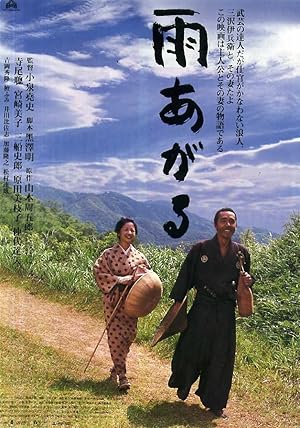
After the Rain Page #4
- Year:
- 1999
- 91 min
- 477 Views
The master of the school of the unity.
Tsuji Gettan!?
Nobody ignores that master over there!
So you entered and did you defy him?
Yes.
But no... you can't go about
defying a man like him...
It's unthinkable.
Precisely...
It's just this 'unthinkable'
that happened.
Master Tsuji,
accepted my challenge
without being begged about it.
Truth and subject are one.
I asked myself...
at what moment I would throw down
my sword and declare myself defeated...
I renounce!
I don't understand!
What happened to him?
I was also surprised.
Without understanding his reasons,
I had revealed my secret intention.
and, Master Tsuji...
I understand now.
To this day,
I have fought
with an uncountable amount of men.
But you were different.
Though you gave the impression
You stayed calm and showed
no desire to win.
I didn't understand you.
I didn't know what to do.
That's why
I lowered my sword.
I am truly beaten, today!
That's cool!
What a nice story!
And then, what did you do?
Master Tsuji took me on
as an apprentice.
He treated me with great affection
and I succeeded in becoming
an instructor.
Thanks to him, I was able to be
engaged in the service of a fief,
But it didn't last.
I really couldn't make it there.
My reputation deteriorated.
I had to leave the fief.
After that,
I've served two other fiefs...
and now, I have no master.
My wife says
that I wasn't made to serve a lord
and expects nothing more of me.
Another thing, I would like to take
a closer look at your sword...
Can I?
I beg you.
Gon, where is the sword of our host?
In the sword-depository.
To say the truth, he's called 'Gonnojo',
but 'little Gon' fits him better.
And now,
let us have a look at the garden.
With all this rain,
It's been a long time
since I set foot in there.
With your permission.
The forging of fine grain...
delicately moistened...
very well drawn groves...
a proud blade
has the freshness
of a spring breeze.
and the perfume.
It's not signed.
But no less admirable because of it.
Where did you buy it?
It's master Tsuji
who gave it to me.
They say the sword
is the soul of the warrior...
Anyway,
it must be hard to be a ronin.
Sometimes it's hard and even painful,
but sometimes it not that bad
and even fun.
You meet all kinds of people
in all kinds of situations.
In comparison,
serving a lord is tiresome.
The officers are all,
without exception, arrogant and blunt.
Their conversations
are uninteresting and spiritless.
They provoke only boredom.
Our lord loves slander.
He also loves to give nicknames.
silence!
This being said,
I also gave you a nickname.
Translation
Translate and read this script in other languages:
Select another language:
- - Select -
- 简体中文 (Chinese - Simplified)
- 繁體中文 (Chinese - Traditional)
- Español (Spanish)
- Esperanto (Esperanto)
- 日本語 (Japanese)
- Português (Portuguese)
- Deutsch (German)
- العربية (Arabic)
- Français (French)
- Русский (Russian)
- ಕನ್ನಡ (Kannada)
- 한국어 (Korean)
- עברית (Hebrew)
- Gaeilge (Irish)
- Українська (Ukrainian)
- اردو (Urdu)
- Magyar (Hungarian)
- मानक हिन्दी (Hindi)
- Indonesia (Indonesian)
- Italiano (Italian)
- தமிழ் (Tamil)
- Türkçe (Turkish)
- తెలుగు (Telugu)
- ภาษาไทย (Thai)
- Tiếng Việt (Vietnamese)
- Čeština (Czech)
- Polski (Polish)
- Bahasa Indonesia (Indonesian)
- Românește (Romanian)
- Nederlands (Dutch)
- Ελληνικά (Greek)
- Latinum (Latin)
- Svenska (Swedish)
- Dansk (Danish)
- Suomi (Finnish)
- فارسی (Persian)
- ייִדיש (Yiddish)
- հայերեն (Armenian)
- Norsk (Norwegian)
- English (English)
Citation
Use the citation below to add this screenplay to your bibliography:
Style:MLAChicagoAPA
"After the Rain" Scripts.com. STANDS4 LLC, 2024. Web. 20 May 2024. <https://www.scripts.com/script/after_the_rain_2652>.


Discuss this script with the community:
Report Comment
We're doing our best to make sure our content is useful, accurate and safe.
If by any chance you spot an inappropriate comment while navigating through our website please use this form to let us know, and we'll take care of it shortly.
Attachment
You need to be logged in to favorite.
Log In